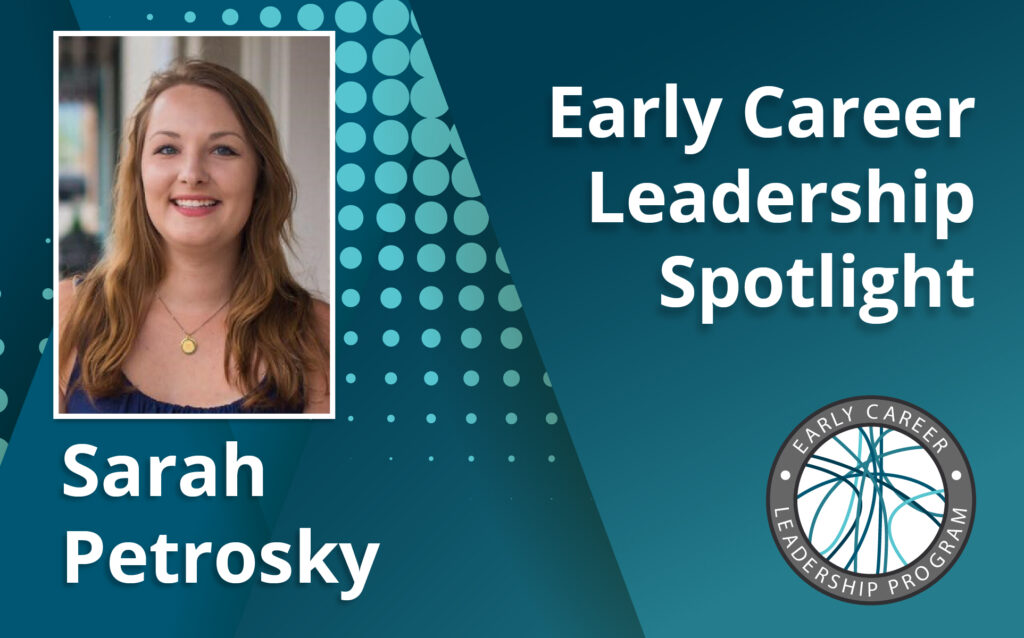We’re taking time to get to know the members of the GSA’s Early Career Scientist Committees. Join us to learn more about our early career scientist advocates.
Sarah Petrosky
Multimedia Subcommittee
University of Pittsburgh
Research Interest
I am interested in understanding adaptation that has been happening recently in populations by dissecting the ways that genes underlying an adaptation are changing. This process seems to be more dynamic than we had expected. Many traits are governed by more than one gene, or are polygenic, so when going from one phenotype to another, changes might need to occur in multiple genes. It is easy to think of this process as linear, where all individuals with the same phenotype have the same variation at the genetic level. It is possible, however, that this process is more patchwork, where multiple individuals may have the same appearance yet are genetically different, or heterogeneous. My doctoral work thus far has been dedicated to dissecting a polygenic, heterogeneous trait in African populations of the fruit fly Drosophila melanogaster.
As a PhD-trained scientist, you have many career options. What interests you the most?
I am passionate about science communication and would love a career that involves sharing current research with the general public. It is my responsibility to help the people in my life understand the impacts of the natural world on their daily lives. I have dedicated a lot of time to the way I present my work so that others can understand my perspective. Previously, I have been involved with a transdisciplinary research group that included biologists, literary scholars, artists, and historians, among others. I recognized quickly that, in meetings with this group, I could not speak about my portion of the research project in the same terms as I would with other biologists, so I took classes in rhetoric and literature to improve my communication skills with those outside my field. Helping my colleagues understand work that is outside of their wheelhouse was rewarding, and in turn, they shared their expertise. This type of relationship, where we are consistently teaching and learning from each other, is valuable, and I would like to continue having this discourse in my career. I enjoy breaking down my work into easily digestible terms, in both the written word and the spoken word. For my future career, I would enjoy writing for the science sections of large publications or working as a communications liaison to foster more effective discourse between scientists and nonscientists.
In addition to your research, how do you want to advance the scientific enterprise?
It is important that my work be accessible to people at varied stages in their development as scientists and that I can break down concepts for non-scientists. Science can intimidate those with little training, so I want to be able to present my work in a way that is not intimidating but welcoming. Creativity is vital to the scientific process, and I want to present an image of science as a creative process that anyone can pursue. When we encourage creative thinking in research, we can make connections that we otherwise might have missed. My own work benefits from being open-minded to the unexpected, and my creativity and willingness to think outside the box have reinforced my research.
In addition, interdisciplinary collaboration has greatly strengthened my past research, and continues to strengthen my current thesis work. When people with varied perspectives work together on a problem, they can sometimes reach a deeper, more satisfying understanding. As an evolutionary developmental biologist, I currently collaborate with a population geneticist. Evolutionary developmental biology and population genetics are two fields that have notoriously different viewpoints on evolution. I have had to work to reconcile these differing views, and I believe both my project and I have improved due to this collaborative relationship. I aim to use my previous experiences to encourage and promote unexpected collaborations.
As a leader within the Genetics Society of America, what do you hope to accomplish?
As a member of the Multimedia Subcommittee, I am involved in developing the ECLP’s podcast, Genetics in Your World. All my contributions to the podcast are done with broad accessibility in mind. I hope that the podcast episodes I have contributed to will be enjoyable not just for geneticists, but students just embarking on their scientific journey. I aim to produce content that is not only informative to scientists at all stages of their career but also relatable and enjoyable. I want scientists who are interested in being on the podcast to feel comfortable telling their stories, and I encourage genuine communication. In addition, I hope that my nonscientist family and friends can listen to my contributions to the podcast and follow along with the conversations.
Previous leadership experience
I have mentored multiple rotation students and undergraduate researchers. I was involved with the University of Pittsburgh’s Gene Team to help the students prepare for college applications. I have taught and given multiple guest lectures, including one at the Community College of Beaver County (CCBC). CCBC lost its wet labs during the COVID-19 pandemic, so I organized a day in the lab for the students. There, members of the lab and I guided them through some of the techniques we use in the lab to give them exposure to an authentic research environment. I was heavily involved in developing a museum exhibit that is still in rotation at the Virginia Museum of Natural History in Martinsville, VA. I was also a founding member of the Dragon Research Collaborative at Roanoke College during my undergraduate education.




